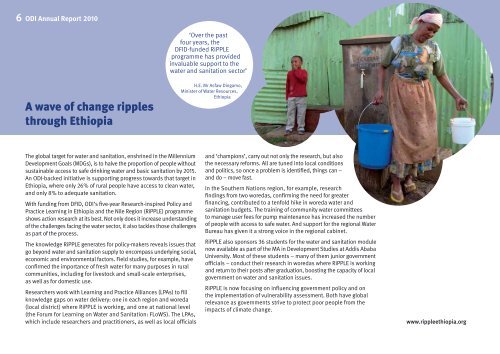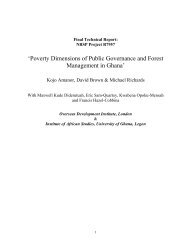ODI Annual Reports - Overseas Development Institute
ODI Annual Reports - Overseas Development Institute
ODI Annual Reports - Overseas Development Institute
You also want an ePaper? Increase the reach of your titles
YUMPU automatically turns print PDFs into web optimized ePapers that Google loves.
6 <strong>ODI</strong> <strong>Annual</strong> Report 2010<br />
‘Over the past<br />
four years, the<br />
DFID-funded RiPPLE<br />
programme has provided<br />
invaluable support to the<br />
water and sanitation sector’<br />
A wave of change ripples<br />
through Ethiopia<br />
H.E. Mr Asfaw Dingamo,<br />
Minister of Water Resources,<br />
Ethiopia<br />
The global target for water and sanitation, enshrined in the Millennium<br />
<strong>Development</strong> Goals (MDGs), is to halve the proportion of people without<br />
sustainable access to safe drinking water and basic sanitation by 2015.<br />
An <strong>ODI</strong>-backed initiative is supporting progress towards that target in<br />
Ethiopia, where only 26% of rural people have access to clean water,<br />
and only 8% to adequate sanitation.<br />
With funding from DFID, <strong>ODI</strong>’s five-year Research-inspired Policy and<br />
Practice Learning in Ethiopia and the Nile Region (RiPPLE) programme<br />
shows action research at its best. Not only does it increase understanding<br />
of the challenges facing the water sector, it also tackles those challenges<br />
as part of the process.<br />
The knowledge RiPPLE generates for policy-makers reveals issues that<br />
go beyond water and sanitation supply to encompass underlying social,<br />
economic and environmental factors. Field studies, for example, have<br />
confirmed the importance of fresh water for many purposes in rural<br />
communities, including for livestock and small-scale enterprises,<br />
as well as for domestic use.<br />
Researchers work with Learning and Practice Alliances (LPAs) to fill<br />
knowledge gaps on water delivery: one in each region and woreda<br />
(local district) where RiPPLE is working, and one at national level<br />
(the Forum for Learning on Water and Sanitation: FLoWS). The LPAs,<br />
which include researchers and practitioners, as well as local officials<br />
and ‘champions’, carry out not only the research, but also<br />
the necessary reforms. All are tuned into local conditions<br />
and politics, so once a problem is identified, things can –<br />
and do – move fast.<br />
In the Southern Nations region, for example, research<br />
findings from two woredas, confirming the need for greater<br />
financing, contributed to a tenfold hike in woreda water and<br />
sanitation budgets. The training of community water committees<br />
to manage user fees for pump maintenance has increased the number<br />
of people with access to safe water. And support for the regional Water<br />
Bureau has given it a strong voice in the regional cabinet.<br />
RiPPLE also sponsors 36 students for the water and sanitation module<br />
now available as part of the MA in <strong>Development</strong> Studies at Addis Ababa<br />
University. Most of these students – many of them junior government<br />
officials – conduct their research in woredas where RiPPLE is working<br />
and return to their posts after graduation, boosting the capacity of local<br />
government on water and sanitation issues.<br />
RiPPLE is now focusing on influencing government policy and on<br />
the implementation of vulnerability assessment. Both have global<br />
relevance as governments strive to protect poor people from the<br />
impacts of climate change.<br />
www.rippleethiopia.org

















